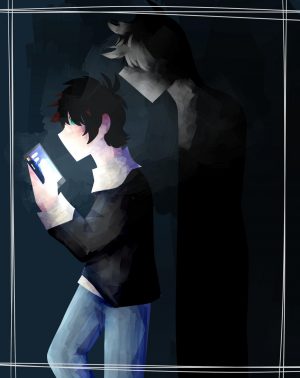Friend-finding apps can be counterintuitively isolating
Apps like Yubo and Omegle have the power to bridge situational and geographical gaps — but at what cost?
November 7, 2019

Settling down in the library for her free period, Lành Matelski pulls out her phone like so many others around her. She opens up Snapchat and sends off a meme to one of her friends. A few minutes later, her phone buzzes with the reply. She opens it and smiles at the return joke, happy for the extra bright spot in her day this friend provides.
But Lanh isn’t chatting with one of her U-High friends, she’s messaging with a new friend from far away.
This is the promise offered by “friend-finding” apps and websites such as Yubo and Omegle, the promise of non-romantic personal connection both nearby and far away. Yet some people are discovering the reality of these sites is much more complicated, from a feeling of isolation and objectification to outright danger.
“It can be really heartwarming when something sweet comes up, but you never know,” said Stella Heon, a junior who used to use Omegle.
Omegle anonymously connects a user to one other person through video or text chat. The site has no restrictions on who can use it, and although there is a moderated video chat, it is still possible to run into inappropriate or upsetting content.
“You don’t get to choose who you see,” Stella said, “so you might get somebody playing their guitar, just trying to brighten somebody’s day…or sometimes you’ll get something really messed up.
Yubo, another friend-finding platform marketed to teens, has users users select and filter their interactions with a swiping function, similar to dating apps like Tinder. Indeed, according to Lành, many users treat the app as a dating app.
“I’d say about 50% of people are looking for romantic relationships, 40% of people are looking for just friends or for people to send them memes, but then there’s this really shady 10%, that you just can’t tell,” Stella said.
That shady portion of the userbase can, like with Omegle, contain adult predators or even teens exhibiting questionable behavior.
“Even when the people on there are real,” Stella said,“You don’t know exactly what they want from you until you’re with them.”
The swiping function can also make some feel objectified or like they are objectifying others.
“Part of it feels good, because there’s the validation that people think I’m attractive,” Lành said, “But then also part of it feels weird, because it’s like I’m judging these people who, if I knew them in real life, I might not even want to talk to them
Both Lành and Stella felt that their experiences on these sites were ultimately hollow. Lành said that she started using the app to feel more connected during a difficult time in her life, but ultimately felt ashamed and more disconnected.
She said, “I honestly think that the people who don’t use apps like that are lucky because they don’t feel a need to resort to apps like that to make friends.”



























































